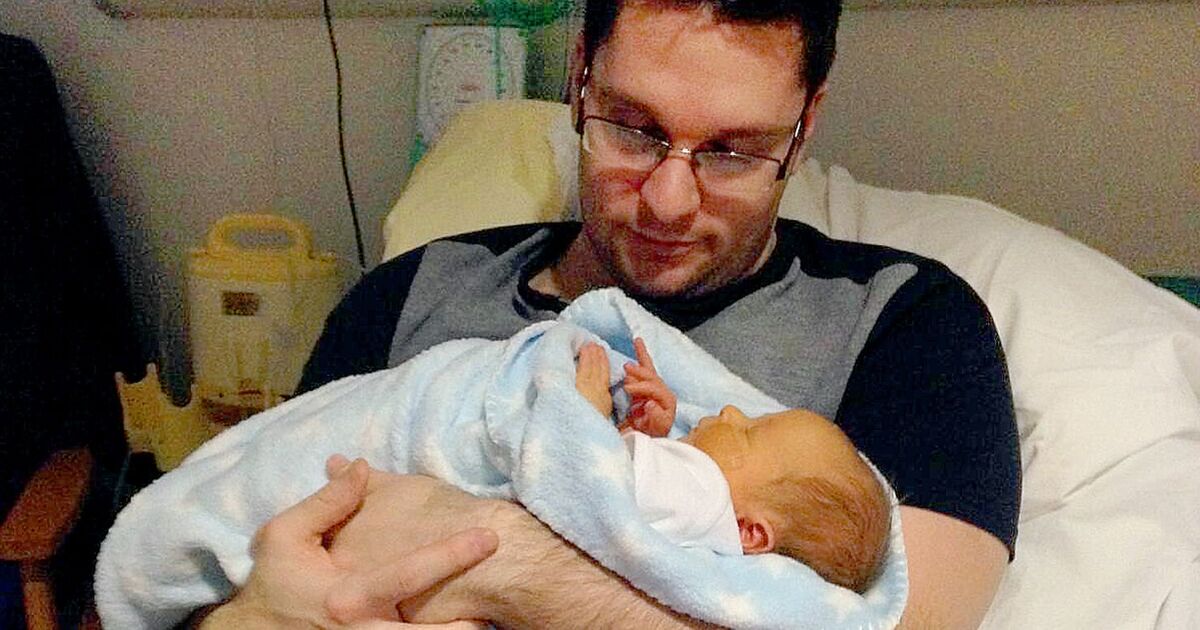Back in December 2015, Dan Rowe was on the cusp of a new adventure. His first baby was about to be born and he was excited to become “the perfect dad, hands-on, involved at every stage”. But while Dan now has a great relationship with his son, he had no idea that his journey into fatherhood would be an incredibly rocky one, with a mental health crisis culminating in three suicide attempts and a diagnosis of male postnatal depression.
At antenatal classes, Dan, now 42, absorbed the message that his role was to support his then wife, Andrea. But during labour, Dan felt helpless. “I tried to do whatever I could to make things better for Andrea, but I felt like I was in the way. Then when my son was born, I didn’t have that explosion of love they told me about. I didn’t feel ‘this is incredible.’ I held him in my arms and it felt strange.”
There was little time to bond with their newborn, Charlie. Within an hour, the tot was whisked away to the Neonatal Intensive Care Unit (NICU). “I remember asking, ‘Where’s my baby?’ – I had no idea where NICU was in the building or what it even stood for. I thought, if I leave this room, I don’t know where to go. I don’t know where he is.”
Charlie had a rollercoaster ride in NICU fighting off an infection, initially making good progress then suffering collapsed lungs.
After 11 days, he was well enough to go home, but there was more drama in store. “We’d noticed that Charlie’s pupil wasn’t completely round, more like a keyhole. Nobody raised it in hospital and we’d put it down to being something that made him even more special,” says Dan.
Then Andrea noticed that in photos, Charlie had one red eye and one white. Doctors told them to prepare for the fact that Charlie may have cancer. “I had what is probably a very male reaction – switching my emotions off, becoming very practical rather than preparing myself emotionally for what may come.”
Charlie was diagnosed with a condition called Coloboma. “They couldn’t say how it would affect his vision until he was older but the condition can indicate problems with major organs, so for the next six months he had to go in for tests to see if he was OK.”
Having gone straight back to work in recruitment after two weeks paternity leave spent in NICU, Dan was already struggling. “I couldn’t concentrate. People say, I bet it’s great to go back to work for a break and outwardly you agree but you’re thinking, why would I want to be at work? I want to be at home with my newborn.”
As months passed and Charlie underwent more tests, Dan felt progressively worse. “It was a constant feeling of failure,” he says, “like what was happening was my responsibility as it was my job as a dad to protect them. Fortunately, Charlie was fine, but it was a whole heap of worry and stress.
“I was unaware of my feelings but Andrea could see I was struggling. I found it so hard to build any sort of bond and didn’t know how to be a father. I thought other dads found it easy. I couldn’t talk to Andrea. I thought, ‘If I feel like this, she must be going through something a million times worse’.
“I was drinking more than usual – recruitment’s a sociable industry so it was never difficult to find somebody to have a drink with. It went from one or two to five, then 10. I have no doubt that getting to the point of being suicidal for the first time was influenced by alcohol. It all happened so quickly with one thought snowballing – I was useless and the people in my life would be better off without me.”
After a mercifully unsuccessful attempt, Dan confided in Andrea, who sent him to the local surgery where, after one less than positive experience, he managed to find a “phenomenal” GP. “I was put on medication and given counselling,” he says. “That was where the notion of post-natal depression was introduced.”
Dan’s reaction to the diagnosis was surprise. “I didn’t know men could get it. It was helpful to have that understanding, but it came with a bit of shame, like, guys don’t experience this. I felt there was a stigma.”
In fact, according to the National Childbirth Trust (NCT), the number of men who become depressed in the first year after becoming a father is double that of the general population, with 25 per cent experiencing mild depressive symptoms and between 10 and 12 per cent being diagnosed with depression.
The peak time for postnatal depression in men is three to six months, with first-time fathers most vulnerable. According to the NCT, it’s not just mothers whose bodies change after birth. They say, “Hormones including testosterone, oestrogen, cortisol, vasopressin and prolactin may change in dads during the period after their babies arrive.” This could be a factor in triggering mental health issues.
While counselling helped Dan understand his issues, there was no time to work on fixing them before his sessions ran out and he had to go on a waiting list for more. He continued to struggle, making two more attempts on his life.
In desperation, he attended his first meeting at one of the peer-to-peer support groups run by charity Andy’s Man Club, which was set up in memory of Andy Roberts, a young father who tragically took his own life. “I’m not sure at that point how keen I actually was to get better. It was last chance saloon.
“The first question at Andy’s Man Club is, how’s your week been? There was a guy who said he’d struggled to be a dad but never felt closer to his kids than he did now. I realised I wasn’t the only guy who’d struggled like that.
“Men often carry these things internally because we don’t feel we have permission to talk. There’s an incredible power hearing a guy you’ve never met before sharing that they’ve been in the same boat.”
He went back the next week, and the next. “It really helped me, having that weekly check-in, getting things off my chest and focusing on some of the positives in my life.”
Six years in, Dan has gone from his first session to becoming a volunteer facilitator, setting up more groups and now working for the charity. “I still have days where I’m overwhelmed but my mental health is good. I have ways of dealing with it. Andrea and I separated, now I have an incredible partner, Steph, and Andrea recently had a baby with her new partner.
“The four of us get on really well, Charlie’s gone from having two loving parents to four, and a baby sister.
“I’m privileged to have a handful of people I trust implicitly. Most of my close friends I’ve met through Andy’s Man Club. It’s completely changed my life.”
This Father’s Day, Andy’s Man Club is partnering with Hallmark on a range of cards designed to convey messages of love, support and understanding, and hopefully kick-start conversations that could save lives.
“What Hallmark is doing is really important, you never know what’s going to get somebody to open up,” says Dan. “I feel really proud of being the dad I never thought I’d get to be – better than I would have been if I hadn’t gone through those challenges. Now I can just cherish the brilliant relationship I have with Charlie.”
Andy’s Man Club offers free peer-to-peer support groups across the UK and online, aiming to end the stigma surrounding men’s mental health and help men through the power of conversation Support the charity this Father’s Day by buying a card from hallmark.co.uk/pages/andys-man-club.
If you need help with suicidal thoughts, the Samaritans are available 24 hours a day, 365 days a year. Call 116 123 or go to samaritans.org









